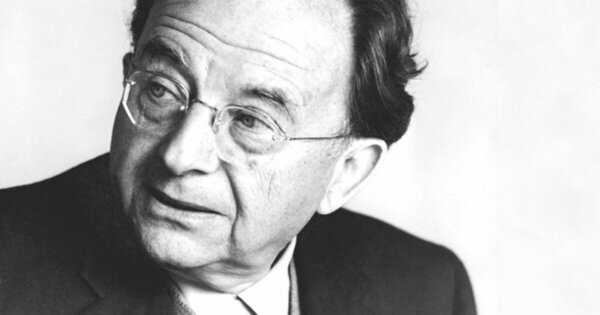The Definition of Strength According to Fromm: The Road to Fullness


Written and verified by the psychologist Valeria Sabater
The definition of strength, according to Erich Fromm, is an exercise of inner reflection that we should all carry out. In a complex world, which tends to self-destruction, moving towards a purely technological society that he had already anticipated, our only hope is to truly develop as human beings.
That development implies reaching plenitude in terms of responsibility, freedom, and self-knowledge.
A pioneer of what he called the psychoanalysis of radical humanism, Fromm was a philosopher and social psychologist who we’d do well to consult periodically.
Not only is he still one of the most enlightened minds of our era. He also continues to lead that intellectual struggle that seeks to shape a type of altruistic society oriented towards more solidary values.
This psychoanalyst of German Jewish origin went beyond Freudian theories and opted for a broader, sensitive, and also critical perspective to analyze the general state of humanity and its problems. He didn’t create any kind of therapy to treat people’s pain and suffering, as Viktor Frankl would do, for example.
However, Fromm was, is, and will always be that voice of conscience that encourages us to value the situation we find ourselves in, and, in turn, what we should aspire to. His ideas about human strength are very interesting. We’ll analyze them below.
“Total humanization requires the advancement of our strength and development to move from selfishness to solidarity and altruism.”
-Erich Fromm-

The definition of strength according to Erich Fromm: what is it?
The definition of strength according to Erich Fromm appears in several of his most remarkable works. One of them, the most interesting one, was The Revolution of Hope. In this book, he spoke about the need to become activists of humanity, people capable of claiming values that challenge the risks of the society of the technological era.
To understand this perspective, we must put things in context. Erich Fromm was forced to flee Germany in 1934 after the Nazi party took power. Much of his perspective is rooted in the horror and pointlessness of World War II.
Later, he emigrated to the United States, where he led multiple peace movements, rose up against the Vietnam War, and declared himself an idealist of a radical and humanist form of socialism.
For much of his life, he was disappointed in the kind of society he had lived in, first in Germany in the 1930s, and later in the United States during the Nixon era.
Thus, in his book, The Revolution of Hope, he urges people towards an individual transformation that would create a paradigm shift in our technological societies. One of those changes was based on the need to learn to be strong.
There are three types of strength (and not all of them are good)
Erich Fromm’s definition of strength urges us to do two things. Firstly, to commit ourselves to hope and faith. Secondly, to know how to react to violence, submission, meaninglessness, and selfishness. From all of this comes the need to learn to be responsible, both for ourselves and in our commitment to society.
However, it’s also interesting to note that Fromm distinguishes three types of strengths. Two of them aren’t useful to us, as they don’t help us to progress or achieve happiness. They’re the following:
- When people show a sense of strength based on violence and aggression and on facing challenges just to demonstrate their own worth (or rather, their selfishness).
- When people exhibit a type of strength that arises as a result of the imposition of an authority figure. That’s to say, that we’re coerced to do things and act as a consequence of fear.
Finally, we find the central idea in Fromm’s theory about the type of strength that we should aspire to. It’s a state of fearlessness in which we can develop and transform our society using optimism, faith, and hope.
“The aim of life is to grow optimally and fulfill one’s potential. If a person has the will and determination to let go of the bars of the prison of narcissism and selfishness, and when they have the courage to tolerate intermittent anxiety, then they’ll experience the first glimmers of joy and strength.”
-Erich Fromm-

The definition of strength according to Erich Fromm urges us to reach fullness
The definition of strength according to Erich Fromm is very reminiscent of the one offered by Spinoza. According to this Dutch philosopher of Sephardic origin, being strong has little to do with physical endurance or even courage. Strength is a virtue that’s related to firmness and generosity.
- Fromm takes that idea and adds the concept of faith as the commitment a person must make to their own progress and that of society. Something he points out in his book The Revolution of Hope is that human beings have a crust of despair and resignation over them. This is dangerous because resignation implies captivity, loss of freedom, and submission.
- We need drive, faith, and enthusiasm. Thus, as he explains in his book To Have or to Be, we need to ignite joy and spontaneity. Only when we’re spontaneous can we demonstrate our freedom.
- The definition of strength according to Erich Fromm urges us to self-development, to get to know ourselves in order to achieve the enlightenment that will lead to fulfillment. It’s then when we become intrepid people who open the door to another exceptional dimension: boldness.
To be bold implies dispensing with idols, chains, and irrational thoughts in order to fight for authentic values with which we can create a more just, altruistic, and supportive society.
All cited sources were thoroughly reviewed by our team to ensure their quality, reliability, currency, and validity. The bibliography of this article was considered reliable and of academic or scientific accuracy.
- Fromm, Erich (2018) La revolución de la esperanza. Fondo Cultura Económica
- Fromm, Erich (1992) Del tener al ser. Barcelona. Paidós.
- Fromm, Erich. (2007) El humanismo como utopía real, la fe en el hombre. Buenos Aires. Paidós.
- Fromm, Erich. (2002) Anatomía de la destructividad humana. Buenos Aires. Paidós.
This text is provided for informational purposes only and does not replace consultation with a professional. If in doubt, consult your specialist.








